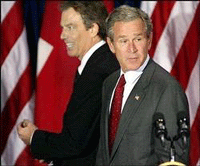 Britain accused Iraq on Monday of actively seeking nuclear, germ and chemical arms and US President Bush pressed the United Nations to act before Saddam Hussein became a threat to civilization.
Britain accused Iraq on Monday of actively seeking nuclear, germ and chemical arms and US President Bush pressed the United Nations to act before Saddam Hussein became a threat to civilization.
UN Secretary-General Kofi Annan questioned the legality of any US military strike without Security Council approval, and Bush's Democratic rival in the 2000 White House race, former Vice President Al Gore, said Bush had embarked on a dangerous course that could derail America's war on terror.
In Iraq, Saddam was said by his exiled opponents to have ordered the digging of trenches outside Baghdad and to have assumed direct control of his Republican Guards in preparation for a US attack.
World oil prices rose to new highs due in part to Iraq's rejection on Sunday of efforts to obtain a new UN resolution calling for Iraqi disarmament, which dealers said fueled fears that war was likely.
Benchmark US crude oil jumped 87 cents to US$30.71 a barrel, at one point hitting US$30.93 a barrel, its highest level since February 2001.
The State Department said Iraq had shown its insincerity in comments over the past few days. "Recent Iraqi statements are just further proof that Iraq is already backtracking on its commitments to have inspections without conditions," State Department spokesman Richard Boucher said.
Bush, speaking at an Army National Guard hangar in Trenton, New Jersey, pounded his theme that Iraq is a test for the authority of the United Nations.
"I want to see strong resolutions coming out of that UN ... a resolution which will allow freedom-loving countries to disarm Saddam Hussein before he threatens his neighborhood, before he threatens freedom, before he threatens America and before he threatens civilization," Bush said.
Bush's leading ally, British Prime Minister Tony Blair, told his cabinet there was no doubt Iraq was continuing to build weapons of mass destruction.
Blair, meeting his ministers to persuade some skeptical members that Saddam posed a serious threat to world security, showed them an intelligence dossier that will be made public on Tuesday ahead of a full parliamentary debate.
"The prime minister said the issue of Iraq and weapons of mass destruction is real, serious and the problem has grown worse in four years without inspections," a spokesman for Blair told Reuters.
"There is no doubt ... that Saddam is continuing with his WMD (weapons of mass destruction) program. We are not talking about historic leftovers but an ongoing, continuing program," Blair was quoted as saying.
Russia, one of the five permanent Security Council members with veto power, called for a two-track strategy, saying weapons inspectors could work inside Iraq while diplomats discussed a new UN resolution.
Defense Minister Sergei Ivanov told a news conference in Madrid: "I think it's perfectly legitimate to go forward on two parallel tracks. ...One aspect does not exclude the other."
The United Nations passed resolutions barring Iraq from possessing nuclear, chemical or biological weapons following its 1990 invasion of Kuwait.
UN arms inspectors sought to enforce the resolutions after Iraq was defeated in the 1991 Gulf War, but they left the country in 1998 following repeated disputes with Baghdad over access to suspected weapons sites.
Iraq agreed last week to the unconditional return of arms inspectors. But the United States and Britain are drafting a Security Council resolution in hopes the 15-member body will allow force if Baghdad does not honor all past UN demands.
In the absence of council action, the Bush administration has vowed to go it alone.
Annan on Monday dismissed reports of a rift with the United States over Iraq, but questioned the Bush administration's doctrine of possible preemptive military action.
Annan said military strikes were permitted in self-defense when a country was attacked, but "when it comes to the broader peace and security issues, the Security Council will have to pronounce itself."
A London-based official in the Iraqi National Congress, the main opposition group which claims to have operatives in Iraq, told Reuters that 60,000 Republican Guards troops have dug in 20 miles from the Iraqi capital.
They were focusing on entrances facing the Jordanian border and Kurdish-controlled areas to the north.
Gore, who narrowly lost the 2000 presidential election to Bush, said in a speech in San Francisco that the Republican administration risked undermining international rule of law by setting its sights on "regime change" in Baghdad.
He lashed out at Bush support for preemptive strikes, calling it "a go it alone, cowboy-style" approach to foreign policy.
Canadian Foreign Minister Bill Graham voiced similar concerns. "While first strike is a legitimate international law doctrine, I don't believe that it is consistent with the United Nations. It's not consistent with the world order that we've been trying to build for the last 70 years through the UN," he told reporters.
In Washington, some Senate Republicans stepped up calls for Congress to pass a resolution authorizing a military strike against Iraq, while Democrats worked on language to narrow its scope.
Sen. John Warner of Virginia, top Republican on the Senate Armed Services Committee, urged Congress to pass a resolution giving Bush the war powers he wants to send a strong signal to the United Nations that Washington was ready to act.
"I don't want to see us reach the lowest common denominator and present a resolution which doesn't have all the teeth that's in this one," Warner said. "I'd rather have a five-vote margin and a strong resolution."
A report prepared by Democrats on the House of Representatives Budget Committee estimated a US attack on Iraq could cost as much as US$60 billion even if swift and successful, with any follow-up and broader economic strain perhaps pushing the final tab to US$200 billion.
(China Daily September 24, 2002)
|

